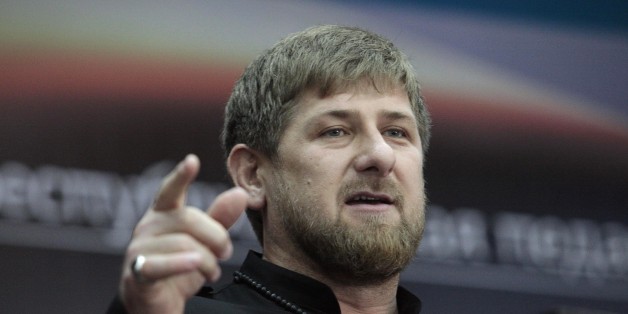
Kadyrov at Loggerheads With Chechen Diaspora in Europe
Publication: Eurasia Daily Monitor Volume: 13 Issue: 44
By:

Ramzan Kadyrov has repeatedly voiced discontent with the actions of Chechens who reside in Europe. During the first years of his rule in Chechnya, he managed to convince many of the former leaders of Ichkeria to switch sides and move back to Grozny. This guaranteed that they would not work against him in the future (Lenta.ru, August 15, 2008). Those who did not return to Chechnya soon learned that the republic’s pro-Moscow ruler could reach them even in Europe: Kadyrov’s own former commander, Umar Israilov, was assassinated in Vienna in 2008 (Novayagazeta.ru, June 3, 2011). Kadyrov even managed to open Chechen Republic representative offices to various European countries (Gazeta.ru, September 11, 2009).
However, the Chechen authorities did not succeed in enticing all the supporters of Chechen independence back to the republic. For example, Ahmed Zakaev, the former minister of culture in the government of Aslan Maskhadov, is one of the most active pro-independence Chechen politicians in Europe. Zakaev’s activities caused a recent rise in tensions between Kadyrov and the Chechen diaspora in Europe. Kadyrov has been trying to lure Zakaev back to Chechnya for the past ten years. Last month, Chechnya’s governor paid an unexpected visit to Ahmed Zakaev’s brothers and sisters in the Chechen town of Urus-Martan (Onkavkaz.com, February 6). The intention of the visit was to show that members of Zakaev’s family live in Chechnya and no one persecutes them. Zakaev’s relatives themselves spoke before cameras about their life in Chechnya and invited him back to the republic. Zakaev, however, rejected the offer and called the televised appeal of his relatives a piece of propaganda. Zakaev said the government had put pressure on his family to condemn his political views (Regnum, February 8).
In response to Zakaev’s refusal to return, Chechen TV prepared and broadcast a 47-minute-long program that featured the members of his Chinkhoi clan. The clan members read excerpts from Zakaev’s statements at a mosque and expressed their “indignation” over his behavior and attitude toward Kadyrov’s policies in Chechnya. The clan members practically cursed him and expressed regret that he is a member of their community (YouTube, February 8).
Zakaev’s activities were not the only cause of contention between the Chechen diaspora in Europe and Kadyrov. Last December, Chechens in multiple European countries unexpectedly staged small-scale protests against Kadyrov’s policies in Chechnya. The protests were unusually critical of Chechnya’s governor: in particular, the protesters condemned Kadyrov’s practice of humiliating individuals who criticize the republican government via social media (Kavkazsky Uzel, December 23, 2015). The Chechen protesters in Europe did not hide their faces out of fear of retribution by the Chechen authorities, but criticized Kadyrov openly.
This was a new development for the Chechen diaspora in Europe. Demonstrations were held in Austria, Norway, and Finland. The authorities in Grozny found no better response to the critics than to threaten their relatives who live in Chechnya. Kadyrov personally spoke on Chechen TV, asking the republican Ministry of Interior to find all the relatives of those who protested in Vienna, Oslo and Helsinki (Kavkazsky Uzel, January 2). Kadyrov’s threats produced another wave of protests, which strongly condemned his actions (Openrussia.org, January 25). Some Chechen protesters even published their own personal messages criticizing Kadyrov (YouTube, February 25).
In response to the protests in Europe, Kadyrov said he would not allow the European Chechens who fled Chechnya to disrupt peace in the republic. Kadyrov asserted that Chechens in Europe were trying to conduct subversive activities against their homeland (Rg.ru, March 1). On March 1, Kadyrov held a meeting with the Chechen police and explained his position regarding the Chechen diaspora in Europe more extensively. According to Kadyrov, “they fled in the first days of the war, and now, sitting in Vienna, Paris or London, are trying to please their masters, expressing some kind of threats against Chechnya, shouting at rallies with their miserable donkey voices something about Chechnya and its people. There will be no return to Ichkerian lawlessness. Chechnya has begun a new life in union with Russia. And we will not allow anyone, especially those buffoons, to interfere with this life” (Grozny-inform.ru, March 1).
The level of influence of the Chechen pro-independence politicians in Europe is negligible in Chechnya, yet Grozny is quite sensitive to what they say because the Chechen authorities cannot become accustomed to the fact that Chechens somewhere could say something publicly against Ramzan Kadyrov. The outflow of migrants from Chechnya and Russia to Europe shows that the situation in the republic is far from acceptable, and people continue to leave. The Chechen Republic was the only territory of the Russian Federation that issued more Russian foreign travel passports in 2015 than in the previous year: the Chechen authorities issued 18 percent more passports than in 2014, while the issuance of passports in the rest of the country fell by 50–70 percent (Rbc.ru, February 26).
It appears that a new generation of young pro-independence Chechen activists is forming in Europe, and evidently they are prepared to engage in public protests despite pressure by Kadyrov’s government in Chechnya and his henchmen in Europe. This means that the idea of Ichkeria has been revived and there will be fresh standoffs between Grozny and the Chechens in Europe.




